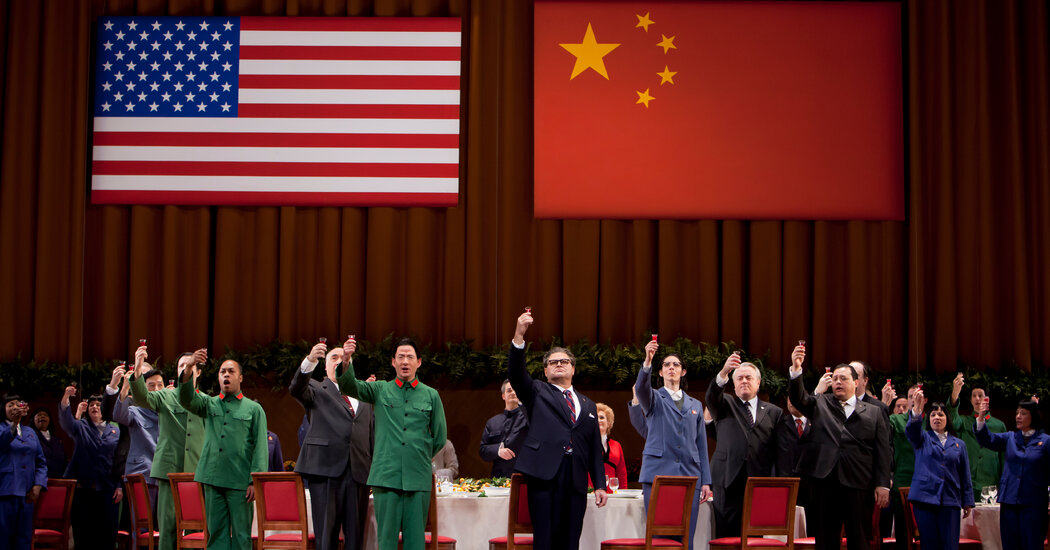Henry Kissinger, the polarizing diplomat who died on Wednesday at 100, received copious distinctions over his long career. But one of the most unusual — an honor that was also damning — came in 1987, when he joined Mozart’s Figaro and Puccini’s Tosca as a character in an opera.
“Nixon in China,” composed by John Adams and directed by Peter Sellars, with a libretto by Alice Goodman, was inspired by President Richard M. Nixon’s epoch-making 1972 trip to China. Kissinger’s secret shuttling had paved the way for the visit, which helped normalize relations between the two countries after a long period without diplomatic ties.
When the opera premiered, it was still a fresh notion that this art form, so associated with the mythical, could address recent history — and treat it not as satire, but as a strangely moving combination of grandeur, humor and tenderness. “Nixon in China” isn’t a realistic account of the trip, but a stylized fantasia on it.
As opera characters, both Nixon and Mao Zedong are faintly ridiculous and faintly noble, singing of their hopes and dreams in Goodman’s enigmatic, evocative lines. And Kissinger — Nixon’s national security adviser in 1972 and, a year later, his secretary of state, too — is there by their side, just as he was in history.
“When Peter Sellars proposed the idea of the opera,” Adams said in an interview, “he had just finished reading Kissinger’s ‘White House Years,’ which I seem to recall being pretty pompously self-congratulatory. I think there was some interest in cutting the secretary down to size.”
“Nixon” sought to unlock the ruminative depths beneath the headlines and set-in-stone positions surrounding a much-reported story. (Adams and Sellars would later do the same in “The Death of Klinghoffer” — another collaboration with Goodman, about a 1985 cruise ship hijacking by Palestine Liberation Front militants — and “Doctor Atomic,” about J. Robert Oppenheimer and the atomic bomb.)
The piece is not exactly sympathetic to Nixon, but it leaves audiences with a more poignantly human sense of him. The opera’s Kissinger, though, is never really human; he doesn’t get the exposure of thoughts and ambivalence granted to the other main players. “He’s not the character we go into great psychological depth with,” Adams said.
He’s not deep, but he’s smooth. In the first scene, as the Americans arrive, and awkward niceties are exchanged in the form of interjections, fragments and repetitions, Kissinger is the only one who sounds comfortable. The role’s bass register gives him sonorous diplomatic suavity; it’s soothing, while everyone else sounds strained and anxious.
“He is and always was theatrical,” Sellars said in an interview.
But this veneer comes off in the second act, during a fanciful reimagining of the Chinese Cultural Revolution propaganda ballet “The Red Detachment of Women.” As in “The Mousetrap” from “Hamlet,” reality and fiction blur: The singer playing Kissinger is, without explanation, in the ballet as Lao Tzu — here, in case you didn’t get the message, a tyrant’s sinister chief aide. (“Doesn’t he look like you-know-who!” Pat Nixon exclaims.)
As Lao Tzu, the grounded suavity of the first act is gone in favor of lascivious, violent extremes; the singer soars into falsetto and, faced with a rebellious peasant, stutters a cry to “whip her to death.” “I’m here to liaise with the backroom boys,” Kissinger-as-Lao-Tzu sings, “who know how to live.”
“People are a little shocked when he appears as the sadistic overlord,” Sellars said. “But obviously he’s the man who’s responsible for Chile and for the secret bombing of Cambodia — the list of atrocities and acts of unspeakable violence is long. And that lurid stuff is behind the jolly and well-spoken diplomat. The surprise is, as always, no one is just one thing. That is one reason you make operatic characters.”
After the ballet unveils Kissinger’s officiousness as sheer brutality, his final moments in the last act are prosaic: “Please, where’s the toilet?” he asks.
And, the libretto tells us, it’s only after he leaves in search of the bathroom that the Nixons, Mao and his wife, and Zhou Enlai, the Chinese premier, can “all enter a state of reverie”: the surreally poetic final ensemble, in which the five characters muse on their lives, their countries and the fate of both.
“How much of what we did was good?” Zhou sings near the end. That kind of self-questioning is wholly absent from the opera’s Kissinger — who, with his charming but ruthless realpolitik, his fist wrapped in a velvet glove, is the opposite of interiority, the opposite of poetry.
Like Nixon, Kissinger knew about the opera. But when it finally arrived at the Metropolitan Opera, in 2011, he passed on seeing it. Adams heard that Kissinger had told people: “I believe I have a sense of humor. But it has its limits.”
#Henry #Kissinger #Character #Opera











Leave a Reply